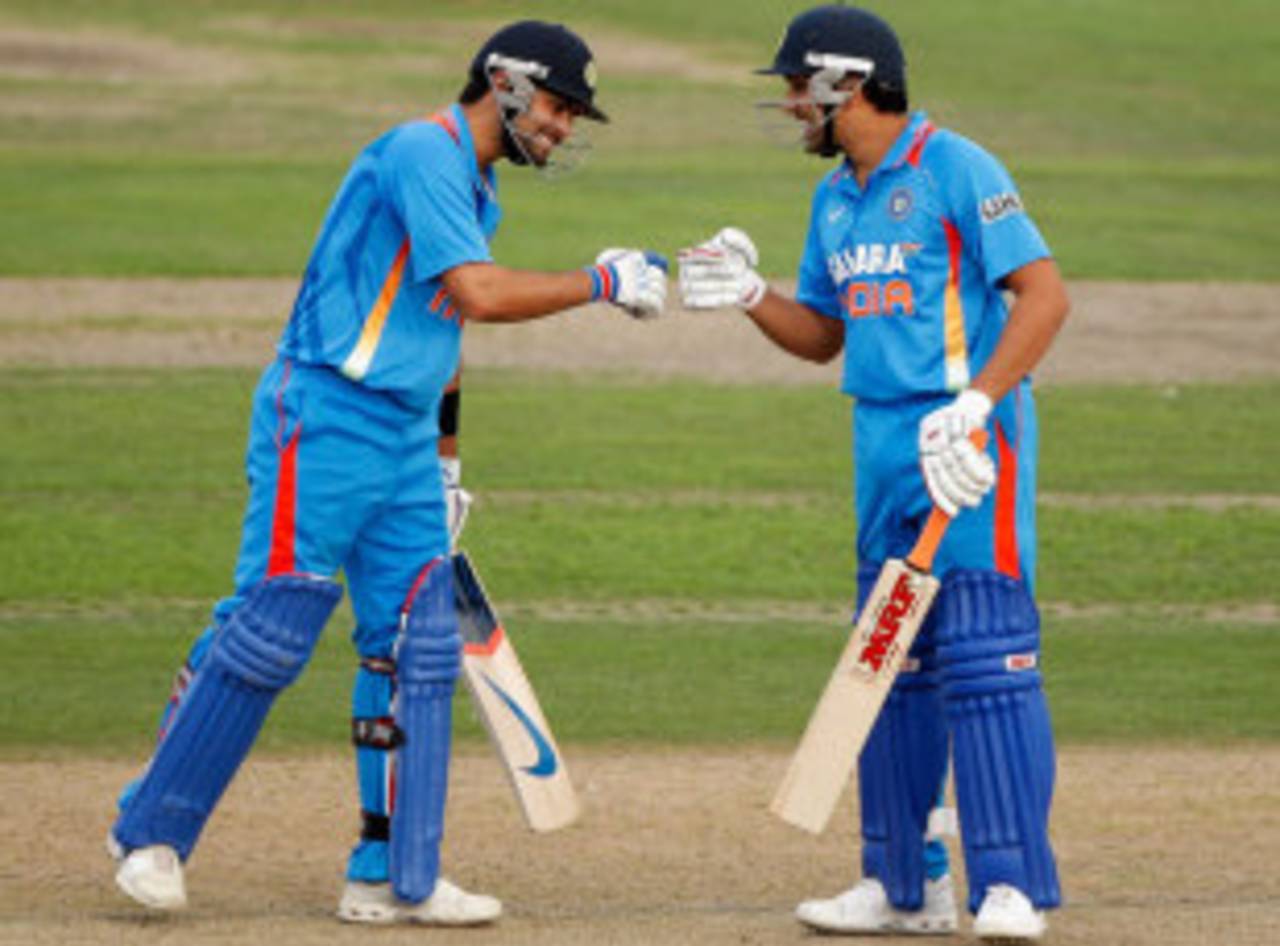Rohit Sharma and the talent problem
It's not just about being gifted but about being able to summon that gift when needed
Harsha Bhogle
10-Aug-2012

Kohli and Rohit: one has won the battle the other has been losing • Getty Images
Beyond the extraordinary race they provided us, Usain Bolt and Yohan Blake have forced us to revisit the eternal debate between natural ability and hard work. On the left, Bolt, he of the fast-twitch muscles and the huge levers; on the right, Blake, who trains so hard that when his coach gives him a programme he "damages it". Did talent beat work ethic then? Is it true that, as Allan Massie in the Daily Telegraph quoted Aldous Huxley, "Nature is monstrously unjust. There is no substitute for talent. Industry and all the virtues are of no avail"?
It is a much deeper debate than that. Nobody is only talented or only hard-working. But there is little doubt that if talent is combined with ambition and work ethic (and make no mistake, there is far, far more to Bolt than mere great natural endowment) it makes for an unbeatable combination. If unequally talented people have an identical attitude, the greater talent will always win. Blake discovered that in London.
But not everyone who is gifted can take the attention and the kind of financial rewards Bolt receives and remain unaffected. Young footballers in England and cricketers in India are excellent examples of that, of how reward can take talent's hand and lead it astray. Let's look at an example.
On March 2, 2008, Rohit Sharma, already a much talked-about name in Indian cricket circles, scored 66 against Australia in a chase in the first final of the CB Series. He put on 123 with Sachin Tendulkar and it was apparent to anyone who had eyes that a special talent had arrived. He didn't just hit good shots, he was calm, organised his innings with maturity and looked ready to play Test cricket. That was four and a half years ago.
Coincidentally, that very day, India's Under-19 players were in Kuala Lumpur playing the final of the World Cup against South Africa. India won it and the captain, Virat Kohli, a name known only to serious followers of Indian cricket, let his feelings go berserk. Wise people shook their heads gravely, worried about his attitude and, in a manner of speaking, put a little black mark against his name.
A month later both players were in the IPL. Kohli, brash and with a swagger that seemed okay for champions but not for 19-year-olds; Rohit, charming people like Adam Gilchrist and Andrew Symonds with his ability. Rohit was the fast-tracker, the next big thing in Indian cricket, Kohli the petulant youngster lighting the fuse of his own destruction.
So what has changed? Rohit's talent still makes your eyes pop. When he plants his front foot down and is still able to swivel and pull over square leg against pace, you know you are looking at someone special. But while extraordinary talent can help you take on the opposition, it can sometimes weaken your own defences. A couple of years ago Symonds told me Rohit was "lazy", that he was looking forward to playing with him again and giving him a "x@#%o*!" because he was the most talented kid playing. Rohit seems to be losing the battle with himself the way some others before him did. As Rahul Dravid said recently, there is a talent to hit a cricket ball and there is a talent to constantly challenge yourself, to get better every day, to focus on what is best for you, to do the hard yards.
At some point in the last four years Kohli realised that there was a virus within him. There was a rage hidden there that, if harnessed, could propel him upwards but which was in the process of demolishing him. I don't know if the voice within him told him that (the voice within always tells us the truth, it's just that we sometimes can't be bothered to listen) or if someone grabbed him by the collar and sat him down. Whatever it was, a new Kohli emerged; someone who could hit the ball very well but someone who was, at most times, in control of himself and with a better focus on life. The battle with himself that Rohit was losing was the battle Kohli was winning.
One day, very soon, Rohit will realise that greatness is not about possessing talent but about having the discipline to summon that talent whenever needed; a lesson that young Deepika Kumari would doubtless have learned too. That is why Bolt won in London - because his training allowed him to summon that outrageous talent when he wanted it to. When that small wake-up call came in Jamaica, he listened to it but he had already done the hard yards to be able to recover. He was the hare but he wasn't letting himself sleep. It is a lesson that many in Indian cricket, even if at different levels of accomplishment, must learn.
Harsha Bhogle is a commentator, television presenter and writer. His Twitter feed is here